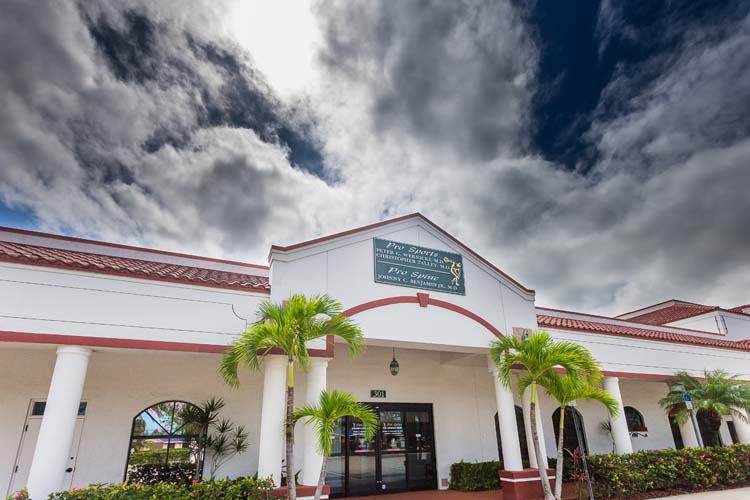
A well-known Vero Beach doctor was behind bars this week days after federal agents filed a complaint detailing his alleged involvement in a cross-country counterfeit drug trafficking operation they say led to the overdose death of a Palm Beach woman.
Dr. Johnny Benjamin Jr., 51, was due in court on Friday, Oct. 20. His bond was set at $820,000. The Pro Spine Center surgeon is a registered controlled substance prescriber in Indian River County and holds staff privileges at the Indian River Medical Center, according to the Department of Health.
Benjamin was arrested by Indian River County Sheriff’s Office deputies late last week at his island home after federal agents claimed he had threatened one of their confidential informants and stole his cellphone during a heated exchange in his office.
Agents with the U.S. Drug Enforcement Agency have been investigating Benjamin, and the informant – who had a recording device – was at his office undercover.
Benjamin was initially charged with strong armed robbery and theft for snatching the phone. But prosecutor Ryan Butler of the State Attorney’s Office also filed paperwork charging the doctor with drug trafficking, and the DEA has since assumed responsibility for the case.
The doctor could face life in prison on the federal drug charges.
Among other things, prosecutors allege that on Oct. 5, Benjamin, under the surveillance of the DEA, purchased thousands of fake oxycodone pills laced with fentanyl with the intent to distribute the drugs up north. Fentanyl is a powerful, addictive narcotic. Misuse and over prescription of the drug has become a serious problem in the United States, resulting in thousands of deaths.
In court filings, federal agents paint a picture of Benjamin that starkly counters the surgeon’s reputation in the Vero Beach community.
Their Oct. 13 complaint describes a physician selling and attempting to manufacture counterfeit drugs for profit with little regard for human life or the law.
The filing begins with a confidential informant (CI) telling Benjamin that it was the doctor’s pills that led to a Sept. 1, 2016, overdose death of a middle-aged Palm Beach woman.
According to the complaint, Benjamin responded “that she was just another ‘page in a large stack,’ and did not seem too concerned about the death.”
Later, the two talked about Benjamin purchasing some “trees” and “blues,” code words for marijuana and oxycodone. They arranged a pick up on a recorded line. The surgeon allegedly said he wanted five racks, or 5,000 pills, to start.
According to the complaint, Benjamin said he “could get a bunch of them gone in ‘New York’ and ‘Philly’ where no one could connect the dots,” court documents allege. The price of the pills was to be $4 a piece.
Federal agents then watched as Benjamin met with the informant behind the Pro Spine Center Oct. 5 for a transfer of the pills. The doctor took a brown paper bag and put it in the trunk of his Mercedes, they say.
The two then moved their conversation inside the doctor’s office. There, Benjamin allegedly advised the CI not to sell locally and to use others to pick up the drugs. Benjamin, the complaint says, told the informant he would be delivering the counterfeit pills to people in the northeast.
Later, the CI warned the doctor the pills were no good. According to the complaint, he said that some people ended up in the hospital after taking them. The informant wanted to make sure Benjamin told his customers to proceed with caution.
“Believe me, I’ll tell them, they will be happy to hear that actually,” the doctor allegedly responded. “But, once again, that’s the reason we’re running it the way we’re running it. Because at some point someone is going to have a problem, someone is going to do something stupid and when it does it needs to be so (expletive) far away … There is no way it can ever come back.”
The next day agents followed Benjamin to the Melbourne airport where he was caught as he was going through security with several bottles of pills and a ticket to Philadelphia. Benjamin told officials he needed them for his neck cancer.
When airport police asked for a prescription, Benjamin allegedly returned to his office and wrote himself a script, the complaint notes. But airport security declined to return the medication, saying that while the doctor was away, they did an investigation and didn’t believe the drugs were used to treat cancer.
The informant and the DEA set up a final undercover meeting with Benjamin at his office last week, but according to the federal complaint, something went wrong with the audio recording device.
Benjamin typed on his computer that he had been stopped by airport police, and wanted to know if the informant was responsible, according to court records.
The informant told investigators that the doctor threatened him with a throat-slitting gesture before saying “to not run and hide because they will just come after you, your mom, your sister and your kids.”
He then took the informant’s cellphone and hid it inside a jar of peanuts. The informant left the office and was able to safely return to the custody of the DEA.
Later that day, deputies went to Benjamin’s home on Painted Bunting Lane and arrested the doctor, claiming he stole a cellphone using the threat of force or intimidation.
Benjamin denied knowing anything about the phone or any of the other charges subsequently filed.
The federal complaint also alleges Benjamin received counterfeit drugs from overseas in the mail and was testing product by sending urine samples to Selecta Laboratories in Miami.
Subpoenaed laboratory records show Benjamin requested three urinalysis reports – all of which returned positive traces of fentanyl.
Benjamin began researching synthetic opioids at his spine clinic office in 2016, the informant told investigators. He was interested in manufacturing pills himself, and the two reportedly purchased a pill press machine in 2013.
Customs and Border Patrol data from last year show that Marsha Benjamin received from China “parts and chemicals typically utilized to service a pill press machine and facilitate the manufacturing of counterfeit pills,” the federal complaint notes.
Records from Sanilac County, Michigan, show Benjamin also was connected to an October 2016 incident involving the alleged felonious delivery and manufacturing of marijuana and maintaining a drug house. That case was moved to circuit court and the records are now suppressed.
Vero Beach defense attorney Andrew Metcalf took on Benjamin’s case Friday. He declined to comment about allegations facing his client, but said he has known the doctor for 20 years.
“He has been a pillar of our community and has an impeccable reputation. We’re going to defend him vigorously,” Metcalf said.
Circuit Court Judge Cynthia Cox signed an order Oct. 12 requiring G.P.S. monitoring of Benjamin if he is able to post bond. She also ordered random drug testing and prohibited the physician from prescribing medication.






